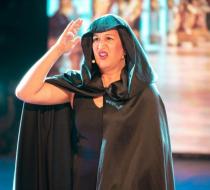Big Bossa Favorite
Wajiha Jendoubi is an actress and one of Tunisia's best-known comedians. To be a woman comedian in this North African nation can be a challenge, but the country's gender gap is narrowing for the first time in almost a decade and Wajiha sees Tunisia as a country that stands for women's rights and supports it.
"My Tunisia is the free woman. My Tunisia is the woman who speaks out. My Tunisia is the woman who is active; the militant one, the hard-working one. My Tunisia is my world," says the popular comedian who is on a mission to make Tunisians laugh about the tough things in life.
"My artistic choices are always about painful subjects. I like to talk about what people are afraid to confront or even don't know how to express. But I always like to say it in a comic way because humour easily reaches the audience."
Through comedy, I try to create pain and puzzlement and questioning too. I am not interested in someone coming to see me on stage and leaving empty-headed. I want them to think and question and try to understand the situation we are in, and the environment too.
When the 2011 Arab Spring began in Tunisia, Wajiha was hopeful. Hundreds of thousands of people took to the streets to demand more democracy from their government. "We had dreams for a better country, a stronger democracy."
However, as events unfolded, "darkness appeared," explains Wajiha, alluding to the rise of The Islamic State of Iraq and the Levant (ISIL, also known as ISIS) that swept across the region.
"People were full of hatred and ignorance. I was always taught that religion is tolerant. A beautiful thing that makes you love life. Love your family and friends, love your work and your life. I was never taught that religion is hatred and killing, blood and assassinations. These things were shocking. I can't accept them. I will never accept them."
In post-revolution Tunisia, "theatre is my weapon," says Wajiha. "I will reject those things [extremism] and cross them out."
Wajiha's comedy show deals with the rise of post-revolutionary extremism. She has performed the show 276 times in five years, selling over 400,000 tickets. When not on stage, she's acting in Tunisian television dramas and is a regular personality on the radio.
As Wajiha lets us into her life, we see her prepare for a new show that is set to launch next year.
Between rehearsals and her performances, we learn that her success in the limelight comes with a great number of challenges at home - mainly finding time for her husband and two children.
"I have two lives and they must work together ... it is my choice to be in an artistic field which requires my body and mind. It occupies my mind, and at the same time my home needs me to be present in body and mind," she says.
Luckily, her supportive husband, Mehdi, picks up the slack when Wajiha isn't around.
"Her days are very long. Sometimes she is shooting from 8am until midnight without coming home. So I take our son to her. That's how it is. We are used to it," says Mehdi, who is the sound and lighting designer on her shows.
But "a family gathering is special and theatre remains a job."
As her work intersects reality and comedy in a country that's still trying to rebuild itself, Wajiha explains. "Through comedy, I try to create pain and puzzlement and questioning too. I am not interested in someone coming to see me on stage and leaving empty-headed. I want them to think and question and try to understand the situation we are in and the environment too."







